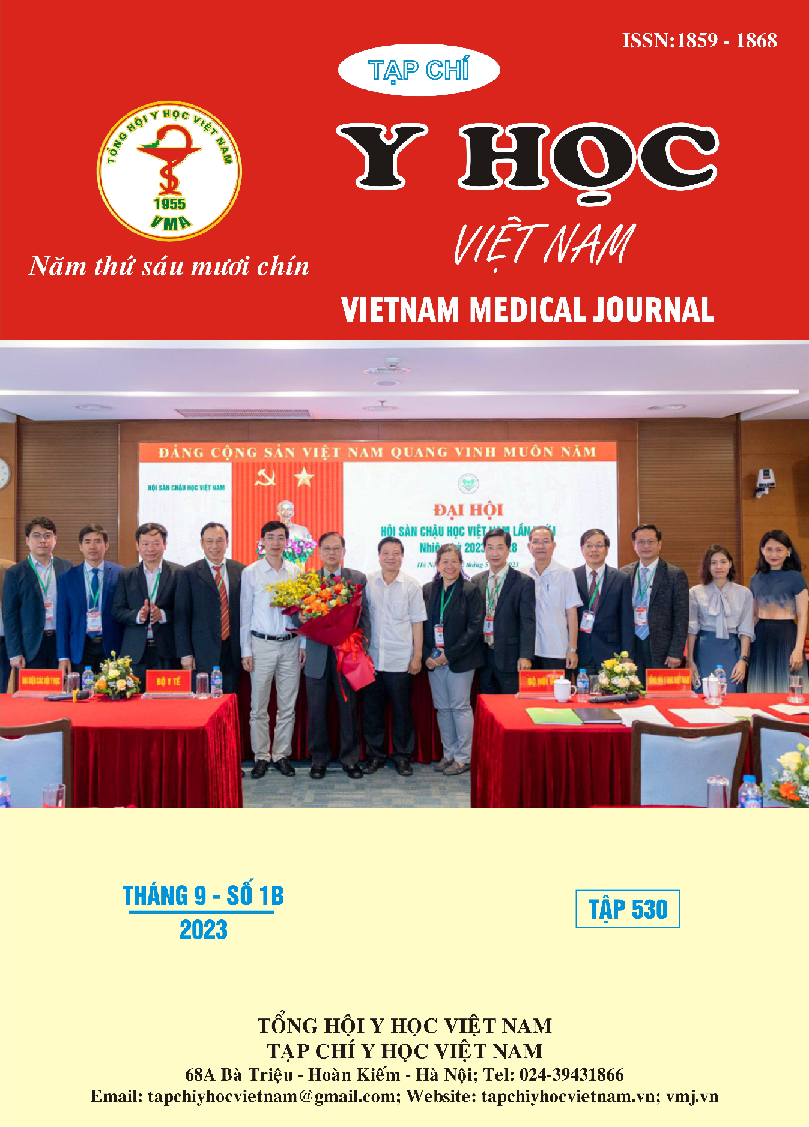KẾT QUẢ ĐIỀU TRỊ UNG THƯ VÒM MŨI HỌNG NGƯỜI BỆNH CAO TUỔI TẠI BỆNH VIỆN K
Nội dung chính của bài viết
Tóm tắt
Mục tiêu: Mô tả một số đặc điểm lâm sàng, cận lâm sàng của người bệnh ung thư vòm mũi họng cao tuổi tại bệnh viện K. Đánh giá kết quả điều trị ung thư vòm mũi họng người bệnh cao tuổi tại bệnh viện K. Đối tượng và phương pháp nghiên cứu: Nghiên cứu mô tả hồi cứu trên 96 bệnh nhân ung thư vòm mũi họng giai đoạn I đến IVA từ 60 tuổi trở lên tại Bệnh viện K từ năm 2018 đến 2022. Kết quả: Tuổi trung bình của các bệnh nhân là 65,8 tuổi, nam gặp nhiều hơn nữ với tỉ lệ 3/1. Đa số bệnh nhân đến viện trong vòng 3 tháng khi có triệu chứng với tỉ lệ 53,1% với triệu chứng hay gặp nhất là nổi hạch cổ chiếm 64,6%. Phần lớn bệnh nhân được chẩn đoán ở giai đoạn II với tỉ lệ 34,4%. Về tỷ lệ đáp ứng hoàn toàn tại u và hạch tại thời điểm 4 tuần sau khi kết thúc điều trị là 84,4%. Thời gian sống thêm toàn bộ (OS) là 55,4 ± 2,2 tháng, thời gian sống thêm không bệnh (DFS) là 50,7 ± 2,6 tháng, thời gian sống thêm bệnh không tiến triển (PFS) là 55,6 ± 2,2 tháng. OS 3 năm, 5 năm đạt 88,9%, 65,5%. PFS 3 năm, 5 năm đạt 88,4% và 69,4%. DFS 3 năm, 5 năm đạt 78,4% và 65,5%. Kết luận: Ung thư vòm người cao tuổi có đặc điểm lâm sàng, cận lâm sàng tương đồng với dân số chung. Điều trị đạt kết quả tốt tuy nhiên còn thấp hơn so với dân số chung.
Chi tiết bài viết
Từ khóa
người cao tuổi, ung thư vòm mũi họng.
Tài liệu tham khảo
2. Lyu Y, Ni M, Zhai R, et al. Clinical characteristics and prognosis of elderly nasopharyngeal carcinoma patients receiving intensity-modulated radiotherapy. Eur Arch Otorhinolaryngol. 2021;278(7):2549-2557. doi:10.1007/s00405-020-06399-5
3. Yeh SA, Hwang TZ, Wang CC, et al. Outcomes of patients with nasopharyngeal carcinoma treated with intensity-modulated radiotherapy. Journal of Radiation Research. 2021;62(3):438-447. doi:10.1093/jrr/rrab008
4. Bùi Vinh Q. Nghiên cứu điều trị ung thư vòm họng giai đoạn III, IV(MO) bằng phối hợp hoá - xạ trị gia tốc 3 chiều theo hình dạng khối u. Luận án tiến sĩ y học-Ung thư học. Trường đại học Y Hà Nội
5. Huang Y, Chen W, Haque W, et al. The impact of comorbidity on overall survival in elderly nasopharyngeal carcinoma patients: a National Cancer Data Base analysis. Cancer Med. 2018;7(4):1093-1101. doi:10.1002/cam4.1377
6. Sommat K, Yit NLF, Wang F, Lim JHC. Impact of comorbidity on tolerability and survival following curative intent intensity modulated radiotherapy in older patients with nasopharyngeal cancer. Journal of Geriatric Oncology. 2018;9(4):352-358. doi:10.1016/ j.jgo.2018.01.006
7. Lu T, Xiong X, Zhong F, Gong X, Li J. Intensity modulated radiation therapy in elderly patients with nasopharyngeal carcinoma. Holist Integ Oncol. 2023;2(1):20. doi:10.1007/s44178-023-00047-8
8. Au KH, Ngan RKC, Ng AWY, et al. Treatment outcomes of nasopharyngeal carcinoma in modern era after intensity modulated radiotherapy (IMRT) in Hong Kong: A report of 3328 patients (HKNPCSG 1301 study). Oral Oncology. 2018; 77:16-21. doi:10.1016/j.oraloncology.2017.12.004


